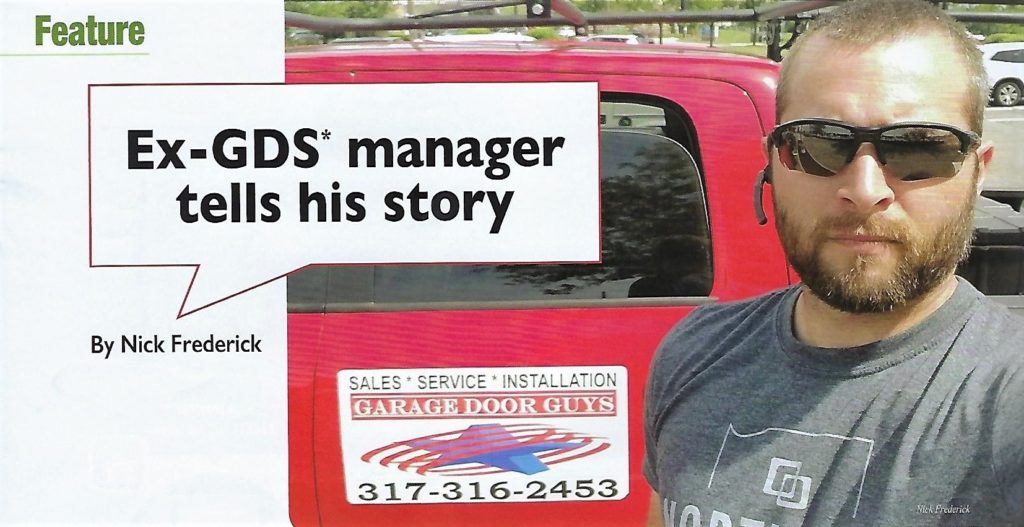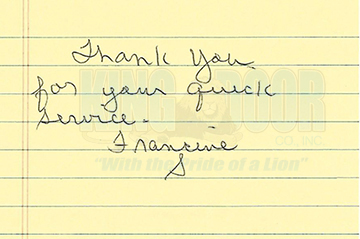Ex-GDS Manager Tells His Story
Editor’s Note: Over the years, more than a dozen employees and technicians of GDS* have approached us. They usually want us to know that our stories about this notorious company have been accurate, and they sometimes are willing to “tell all.” Nick Frederick is a special case because he was with GDS from 2012 to 2018, he was a manager, and he knew about the company’s response to major developments, including the award-winning investigative report in 2015 (“The Worst Garage Door Company in the Nation”), the 2017 conviction of GDS technician Tim Patterson, the revoking of their California business license, and Google’s shutdown of GDS ads. This is Nick’s story.
I first found GDS in 2012 through a newspaper ad that promised pay of upwards of$100,000 a year. I was 31 years old and had a wife and four kids, and the pay was attractive to me. So I started working as a service technician for GDS in San Diego in July 2012. I already had 12 years of experience in the garage door industry.
GDS Training is Sales Training
The GDS training lasted two weeks and was mostly sales training, which was basically how to make a $200 or $300 ticket out of a safety sensor being out of adjustment. I questioned GDS tactics right from the beginning of training. Working with a senior technician, we went to a customer’s house that had a safety sensor that had been knocked off. When we got into the garage, I reattached the sensor and told the customer that it was the only problem. The training technician was upset that I fixed it because he had no way of making money off the job. When I got into the field, the pressure was on to keep a $350 minimum average-not so much focused on how to do the job correctly but how to make the biggest tickets. The culture in the company was, “Who can produce the biggest tickets?” Tim Patterson’s method of selling was highly praised and was based on high-pressure tactics used on unsuspecting individuals who didn’t know any better.
Competing for Bonuses
Lots of bonuses were given out in my first two years, such as highest ticket of the day, highest average for the day, and highest sales for the week. The biggest bonuses were given out to the top three technicians at the end of the year.
I think it was 2014 when Chris Myer (a technician in Minnesota) placed first with close to $800,000 in total sales for the year, and he got a $3,000 bonus. Tim Patterson placed second with about $700,000 in total sales and received a $2,000 bonus. I finished in third place with about $650,000 in sales, and I received a $ 1,000 bonus. (Each of us was paid around 25 percent in commission for those sales.)
Beating the Highest Ticket
Every day, the goal was bigger and bigger tickets and more and more money. When I first started with GDS, the company was making approximately $700,000 in sales per week. It quickly became well known that the goal was reaching $1,000,000 per week in sales. When they finally hit $1,000,000 /week, corporate threw a big party.
The increased sales came when GDS started doing electronic invoices, and all the techs could see the online leaderboard showing who had the highest ticket so far for the day. You could log on at any time and see the amount of every ticket that was closed out so far.
Since there was a bonus for the highest ticket each day, techs would try to beat the highest ticket posted up to that minute. Weekly sales increased very quickly. Videos were put out on the company website with Pete Stephens and Jason Romo announcing the bonuses for the week. As I look back, I realize it was a very shameful time to be a part of GDS. At the peak, I think GDS made $1.6 million per week. That was when Tim Patterson and Chris Myer were still top producers.
Promoted to Manager in Indiana
I left San Diego in 2015. GDS was looking for top technicians to fix a couple of struggling cities. I chose Indianapolis because it was small, it didn’t have a lot of technicians, and I got a chance to be manager. When I was in California, I was an employee, and I received benefits and profit sharing. My move to Indiana was beneficial to the company because I was no longer an employee. Instead, they classified me as an independent contractor, and I received no benefits. I continued to receive 27 percent commission on every job, plus $ 125/week for manager’s pay.
The conviction of Tim Patterson in the summer of 2017 was just a small bump in the road for GDS. Of course, they washed their hands of him before they could be officially implicated. But in my view, they were clearly guilty of creating an atmosphere that encouraged technicians to be just like Tim. “Leave your conscience at the door” The first couple of years with GDS was great because of the money. The motto around the company was, “Leave your conscience at the door.” But shortly after my move to Indiana, my conscience found it more and more difficult to do business the GDS way.
Because of the large number of jobs coming in (thanks to Google advertising), I had to put into the field new trainees who were completely unprepared to fix garage doors properly. The company just wanted more guys to run all the jobs that were pouring in.
New technicians were required to work six days a week from 7 a.m. until 8 or 9 p.m. By early 2016 I’d had enough, and I resigned as manager of Indianapolis but continued to work as a GDS technician.
The Google Shutdown
In late 2017, Google really hurt GDS when they shut down GDS’s ads. Initially, corporate wasn’t too concerned, because they just kept creating new websites with new company names about as fast as Google could shut them down.
Some technicians who knew what Google was doing were told to keep it quiet. It seemed clear that corporate was worried about techs jumping ship because of the loss of business. And that is exactly what started happening. GDS tried to pass the new Google Verification process, but they failed. Their sales took a big hit after that, even though they continued to advertise with Angie’s List and coupon books like Valpak, Money Mailer, LivingSocial, and Groupon.
About that time, I had a phone conversation with Jason Romo about changing the pricing system so the techs could not change any prices or charge multiple labor charges. Jason said, “We’re working on it,” but I never saw any evidence. It was clear to me that all they were working on was how to get back on Google.
Breaking Away
Fortunately for me, I had started my own garage door company and was just waiting for the right time to break off from GDS. Finally, in January 2018, I was let go for refusing to work the hours and days they wanted me to and for not generating the sales numbers they wanted. It didn’t seem to matter that I was one of the most senior and most knowledgeable technicians in the company.
In retrospect, I should have left GDS a long time before I did. In my mind, I justified my last year with the company because I charged customers appropriate prices. As long as I was treating my customers fairly, I could sleep at night. But I couldn’t continue to associate my name with a company that, in my view, does the majority of their business unethically.
The Future of GDS?
I believe the only way GDS can survive the next couple of years is by overhauling the way they do business, by hiring technicians as employees and paying them fairly. But it’s clear to me that the people who run corporate are only in it for the money-make as much and as fast as you can.
Whenever their practices get exposed, they don’t change their practices -they just disguise them in some way. That has been their consistent pattern in my six years with the company. For example, when California revoked their business license in December 2017, they continued to do business there every day, according to my contacts in California.
After the big hit from Google, I have a feeling they won’t be able to sustain the business much longer. I think we will soon see more and more GDS locations shut down. Personally, I hope that GDS will be gone within two years. It will be good for consumers, and it will be good for the industry.


